
A report by Statista says that by 2028, the number of users in the online education market in India is expected to reach 287.6 million. This is where the best LMS software in India come up. Especially with the demand for seamless & interactive training experiences going higher.
In this blog, we’ll explore the 17 best LMS software in India, with their features, pros, cons & ratings on leading software platforms. Aiming to help you make an informed decision and invest in success.
Key Features to look for in an LMS for India
- Mobile Compatibility: According to a Deloitte study, India is expected to have 1 billion smartphone users by 2026. Ensuring that the LMS is mobile friendly will allow more learners to access content on the go.
- Tracking & Reporting: Robust tracking and reporting functionalities provide insights into learner progress, performance, and engagement. Hence, helping identify areas for improvement.
- Integration & Compatibility: Consider the LMS’s compatibility with other systems and tools your organisation uses. Such as HR software or content authoring tools.
- Security & Data Privacy: Robust LMS security features & measures are essential to protect sensitive learner data. And ensure compliance with data privacy regulations.
- Customer Support & Training: Look for a reliable customer support along with comprehensive training resources. This helps administrators and users make the most of the LMS.
- Scalability & Flexibility: Choose an LMS that can scale with your organisation’s growth. And adapt to evolving learning requirements.
- Multilingual Support: According to the Census of India (2011), India has 123 major languages. Of which 30 were spoken by more than a million native speakers. If you operate in such a diverse region, consider an LMS with multilingual support.
To know in depth about more features. Check our blog on learning management system features.
17 Best LMS Software in India in 2025
1.Edmingle
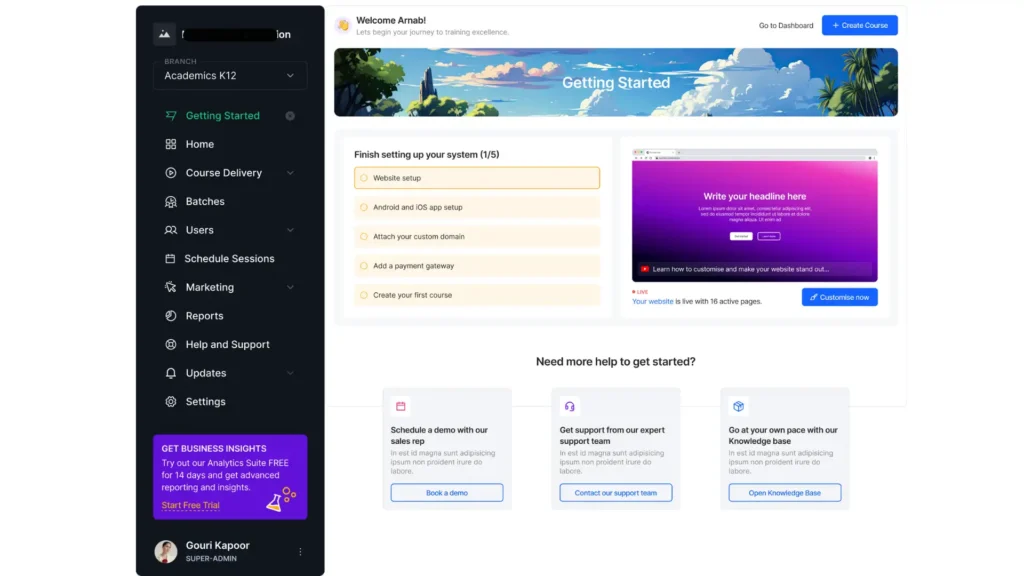
Edmingle stands as a one-stop solution for all training needs with a wide range of useful features. A robust and scalable platform. It comes with absolutely zero hassles of management or technology.
One of its remarkable features is that of multiple batch & branch management. Apart from others like 100% white-labelling and exceptional customer support & service. It also has a very useful set of integrations.
As if these advantages weren’t enticing enough. Edmingle is trusted by 5000+ training businesses across 160+ countries. This includes leaders like McGraw Hill, MIT SDE, Aditya Birla Education Academy, LawSikho and many more.
Pros:
- Multi-tenancy support for managing multiple batches & branches/sub-organisations
- Robust analytics & reporting for efficiently tracking learner activity & engagement
- Vanity URLs for delivering seamless partner training
- Easy to use, navigate & implement platform
- Streamlined learner journey and training workflows
Cons:
- Some extra features or integrations may take some time
Rating: 4.5 out of 5 on Capterra.
2.Moodle
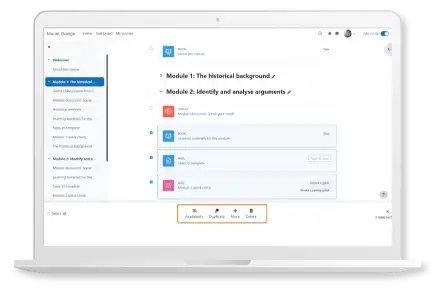
Moodle is a widely-used open-source learning management system due to its flexibility & cost-effectiveness. Especially favoured by educational institutions & universities, Moodle allows for extensive customisation while supporting SCORM & Tin Can compliance. It also facilitates blended learning with a strong community & plugin ecosystem.
Pros:
- Highly programmable & customisable
- Easy to navigate for learners
- Offers automated emails, mobile alerts & learning analytics
Cons:
- Customisations require a high level of tech expertise and is dependent on the course or system designer
- May come out as outdated or clunky to modern users/admins
- Building learning modules is time-consuming
- You’ll need to hire an expert to get through operations smoothly
Rating: 4.3 out of 5 on Capterra.
Read more about open source LMSs.
3.TalentLMS

TalentLMS is a cloud-based LMS known for its simplicity, intuitive user interface & rapid deployment. It caters to both corporate training & academic sectors in India. Features like gamification, mobile learning & robust analytics make it suitable for SMEs and training institutes.
Pros:
- Simple to use & get started with quickly
- Easy for non-LMS experienced users to manage
- Customisable & easy to navigate
- Supports multiple languages
Cons:
- Lacks advanced features and may come off as too simple
- No option for multiple white labelled portals/websites
- Limited ability to set up groups for individual management
- Limited reporting capabilities
- Could be made more affordable for small businesses
Rating: 4.7 out of 5 on Capterra.
Choose one of the most affordable LMS software for your business.
4.Adobe Captivate Prime
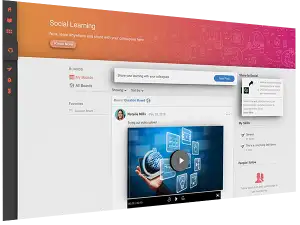
Adobe Captivate Prime offers advanced learner tracking, skill-based learning paths & integration with other Adobe tools like Captivate & Creative Cloud. It’s popular among enterprises for employee training & compliance programs. Its AI-based recommendations & automated workflows support scalable & personalised learning experiences.
Pros:
- Simple tool for building courses with drag and drop
- Ease of use
- Easy & fast to build responsive eLearning courses
- Offers simulations, quizzes & surveys
Cons:
- Users report some bugs in the editing & design features
- Requires more flexibility with design tools.
- Complicated features require a dedicated developer or a steep learning curve
Rating: 4.4 out of 5 on Capterra.
5.Docebo
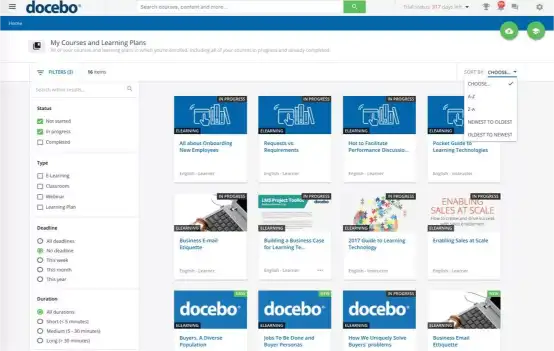
Docebo is an AI-powered LMS used by large enterprises & corporate training teams. It offers automated content delivery, social learning & robust integrations with CRM & HR software. In the Indian market, it is known for its scalability & effectiveness in onboarding, upskilling & partner training in IT and BFSI sectors.
Pros:
- Easy to use, customise & build custom reporting
- Great customer service, knowledge base articles & community
- Great content library
- Vast features with a cadence of new releases
Cons:
- Users report limitations on having more than one direct manager for every user
- No option to archive courses
- Limited user/access roles
- Lack of customisation on pages
- Restrictions on user licenses and their transfer
- Initial setup & configuration can be complex & time-consuming
Rating: 4.4 out of 5 on Capterra.
6.Litmos

SAP Litmos is an enterprise-grade LMS with strong support for mobile learning, video-based training & assessments. In India, it is favored by MNCs & fast-growing companies that need quick implementation & scalability. It stands out for its ease of use, integration capabilities & security compliance.
Pros:
- Good user interface for both admins & learners
- Sufficient & easy customisation & branding options
- Large number of features & integrations available
- Quick to load, easy to use, search & navigate
Cons:
- Handling large data from admin side is sometimes difficult
- Limited bulk operations for changing certificate templates
- Needs a refresh & graphics updated
- Lacks a preview mode
Rating: 4.2 out of 5 on Capterra.
7.Blackboard
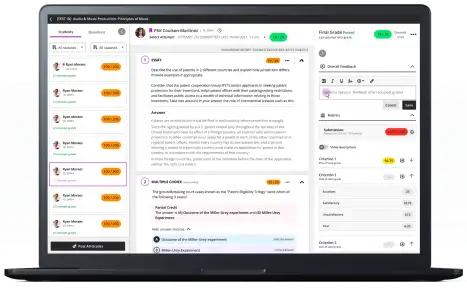
Primarily catering to higher education, Blackboard has a strong footprint in Indian universities & colleges. Known for its robust virtual classroom features, content management tools & detailed assessment modules. It supports both synchronous & asynchronous learning. Its deep learning analytics help educators track performance & improve outcomes at scale.
Pros:
- Organised, easy to navigate & use for students
- Discussion board feature is very useful
- Intuitive interface with AI used to help set assignments & tests
Cons:
- Not as user friendly as other LMSs
- Email system & discussions forums could be made more effective & easier to navigate
- The UI design is a bit outdated
- Users report system crashes & lags
- Does not allow large files
Rating: 4.2 out of 5 on Capterra.
8.iSpring Learn
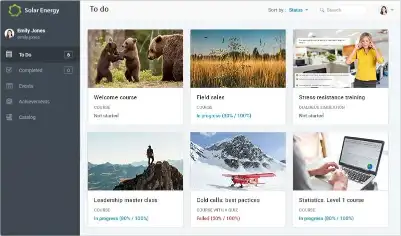
iSpring Learn is a straightforward, user-friendly LMS best suited for corporate training. It integrates seamlessly with iSpring Suite for rapid eLearning content creation. In India, SMEs and L&D teams appreciate it for its speed, mobile-friendliness & support for certification-based learning.
Pros:
- Simple to build courses with iSpring Suite integration
- Fast & helpful support
- Continuous improvements with the addition of new features
- Easy management of various functions
Cons:
- Users report the need to improve reporting & tracking
- Complex account management functionalities
- Quite complex to use, may not be self-explanatory or intuitive
Rating: 4.7 out of 5 on Capterra.
9.Paradiso LMS
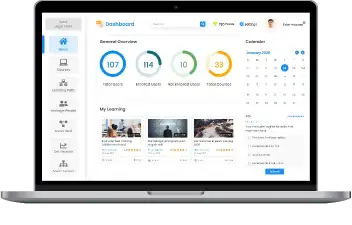
Paradiso LMS offers a modular & customisable platform. Widely used by educational institutions & corporates for its multi-tenant architecture, advanced gamification & white-labelling options. Paradiso supports integration with over 100 third-party apps, making it versatile for hybrid training environments.
Pros:
- Best features & functionalities
- Easy to use at a cost-effective price
- Great features like gamification & interactive videos
Cons:
- Doesn’t work with Shopify
Rating: 4.2 out of 5 on Capterra.
Read more about hybrid training.
10.Thinkific
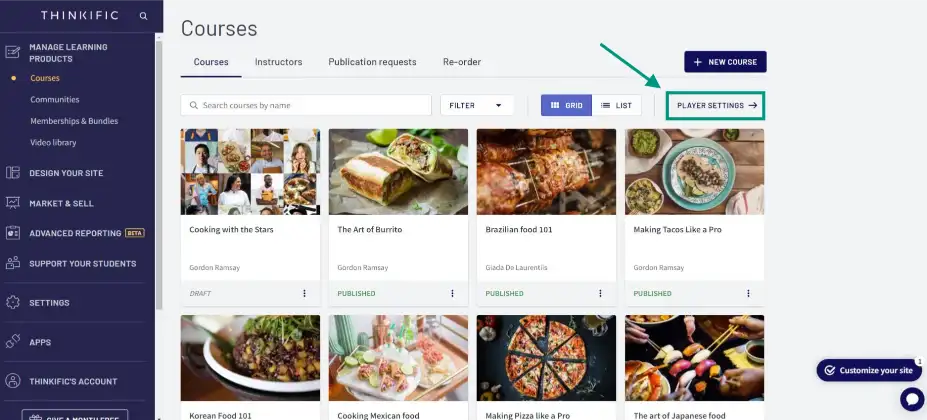
Thinkific is a course creation & delivery platform popular among independent educators, coaching businesses & edtech startups. It enables creators to build branded course websites without coding. While it’s not a traditional LMS, it excels in monetisation tools, learner engagement features & community-building capabilities.
Pros:
- User friendly for both admins as well as learners
- Content uploading & organisation is easy & linear
- Easy to set up & upload a course
- Offers a wide range of features
Cons:
- Non-customisable features, some don’t even work
- Poor customer service
- Tough to navigate dashboard
- Interface feels a little clunky to interact with
Rating: 4.4 out of 5 on Capterra.
If you’re new to the process of course creation our 12-step guide on on how to create an online course will help you.
11.BrainCert
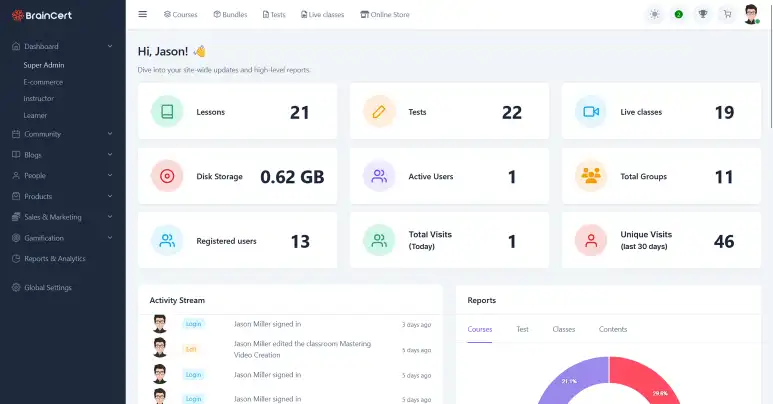
BrainCert offers an all-in-one platform with an integrated virtual classroom, course creation tools, and assessment features. Particularly well-suited for training businesses and test-prep providers in India, BrainCert supports multilingual content, white-labelling, and SCORM-compliance. Its rich virtual classroom is a standout feature among Indian coaching and tutoring platforms.
Pros:
- Offers course bundles, coupons, scheduling online courses & gamification features
- Provides virtual classroom, course management & branding capabilities
- Ease of use & comprehensive feature set
- Helps real-time collaboration along with detailed analytics
Cons:
- Manual enrolment of learners to courses
- Sometimes the platform can feel a bit overwhelming with so many features
- Initially, it’ll be tough to navigate & fully understand all the tools
- Has some bugs in feature releases
Rating: 4.3 out of 5 on Capterra.
12.Fedena

Fedena is a school & college management software that comes with integrated LMS features. It’s widely adopted by Indian educational institutions. It offers modules for course management, attendance, grading & more. Its strong ERP capabilities make it a go-to solution for schools seeking a holistic academic management system.
Pros:
- Easy to use for teachers & staff
- Good support offered
- Nice work flow with plenty of good features
Cons:
- Installation & set up is complex with a lot of missing files
- Depends on a developer for installation
- Gradebook is difficult to navigate & inaccessible for non-tech experts
- Seems designed more for exam-centric schools
Rating: 4.2 out of 5 on Capterra.
Explore the list of best LMSs for small businesses.
13.eLucid
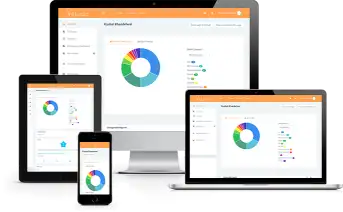
eLucid is designed specifically for workplace learning, emphasising personalised journeys, gamification & micro-learning. Its content delivery engine supports video, PDFs, quizzes & simulations. Indian companies appreciate it for its automation & analytics that simplify compliance & skill development tracking.
Pros:
- Inbuilt authoring tool with support for H5P interactive video format
- Responsive account managers & developers
- Innovative features, flexible & easy to deploy
- Varied quiz types with blog, chat & virtual classroom features
Cons:
- Analytics engine doesn’t work seamlessly
- Courses & cohorts do not work in sync
- Limited features to record & report against instructor led courses
- The UI is a little sticky & confusing sometimes
Rating: 4.2 out of 5 on Capterra.
Check out our blog on best LMS for coding courses.
14.Learnyst
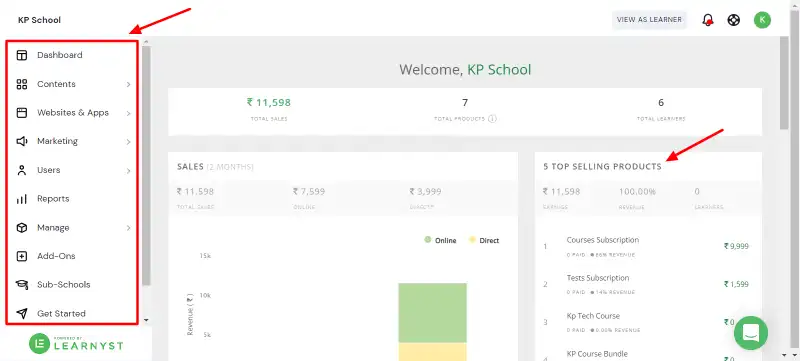
Learnyst caters to educators & coaching institutes in India looking to go digital with their own branded platform. It supports live classes, mock tests & course selling functionalities. Especially popular among competitive exam trainers, it offers localised payment integrations & marketing tools.
Pros:
- Good features like live sessions, session recordings & coupon codes
- Good UI & customer support
- Live tests feature is useful
- No restrictions on the number of people attempting quiz
Cons:
- For each module, you need to pay separately
- Watermark & bandwidth limitation need to be purchased as an add-on
Rating: 4.3 out of 5 on Capterra.
Check out the best LMS platforms for selling courses.
15.UpsideLMS
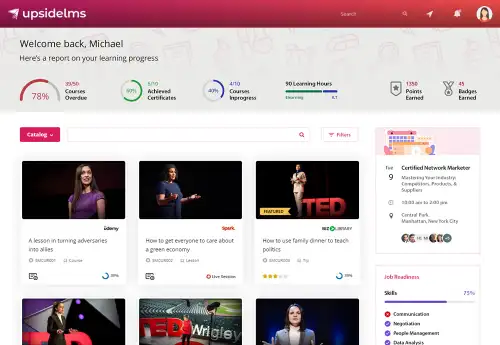
UpsideLMS serves corporates & training providers with a scalable, mobile-first platform. It includes AI-powered recommendations, blended learning & a strong content library support. It’s a preferred choice for L&D teams in retail, BFSI & telecom sectors due to its compliance, multilingual support & rich analytics.
Pros:
- User friendly platform with good service
- Easy to use & navigate for learners
- Easy login access & options to create videos, course and curriculum
Cons:
- Lacks feedback feature
- Complex to search courses
- Poor reporting structure with limited analytics
- SCORM file upload needs a bulk upload option
- Delay in updates & customer support
Rating: 4.3 out of 5 on Capterra.
You might also like to read about SCORM compliant LMS platforms.
16.Graphy
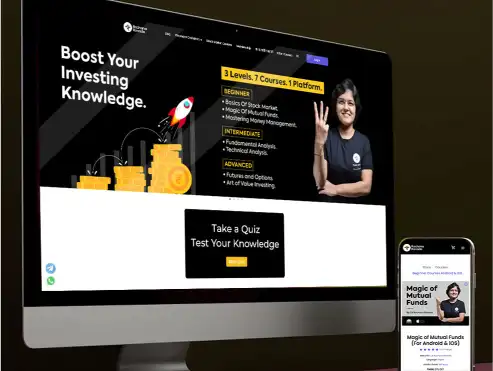
A product by Unacademy, Graphy is tailored for content creators, educators & influencers in India. It allows users to build websites, sell courses & host live sessions. With features like drip content, marketing automation & payment gateway integration. It supports entrepreneurs in monetising knowledge effectively.
Pros:
- Easy to get started with
- Ease of use with a good range of integrations
Cons:
- Users report horrible customer service
- Pricing is on the higher side
- Reviews mention limited customisation of landing pages & UI design
Rating: 4.7 out of 5 on Capterra.
17.WizIQ
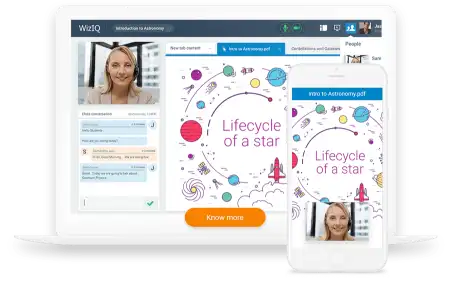
WizIQ is heavily used by schools, universities & coaching centres. Especially for its interactive tools like whiteboards, polls & breakout rooms. It supports both synchronous & asynchronous learning while offering seamless integration with Moodle.
Pros:
- Easy to use interface
Cons:
- Unresponsive customer support
- System is prone to downtimes and hacks
- Users report weak servers cannot handle more than 20 learners at a time
Rating: 3.6 out of 5 on Capterra.
Explore more about LMS for coaching institutes.
Selecting the Best LMS Software in India
Just knowing the features, benefits & the available options isn’t enough for getting started. While choosing an LMS, you need to consider your specific needs, objectives, budget & long-term goals.
Some providers may offer free trial periods or demos to help you assess whether the LMS aligns with your requirements. Before making a commitment, you must read user reviews on platforms like Capterra, G2 & SoftwareSuggest.
Remember to compare different options and explore the features that best fit your training needs & objectives.
Check out the list of best Indian LMS service providers.
Conclusion
For coaching institutes aiming to expand digitally & universities upgrading for online academic delivery. And even for corporate L&D teams driving skill development, selecting the best LMS software in India is a strategic decision.
This list of the 17 best LMS platforms in India for 2025 covers a wide range of use cases. From open-source options like Moodle to enterprise-ready platforms like Docebo & SAP Litmos. Each comes with its own set of strengths, making them ideal for different goals, budgets & technical capabilities.
Before finalising your choice, opt for a free trial or demo to see how well the platform aligns with your unique learning needs. By doing this, you’ll ensure investing in better learning outcomes & improved engagement.



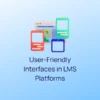

Leave a Reply